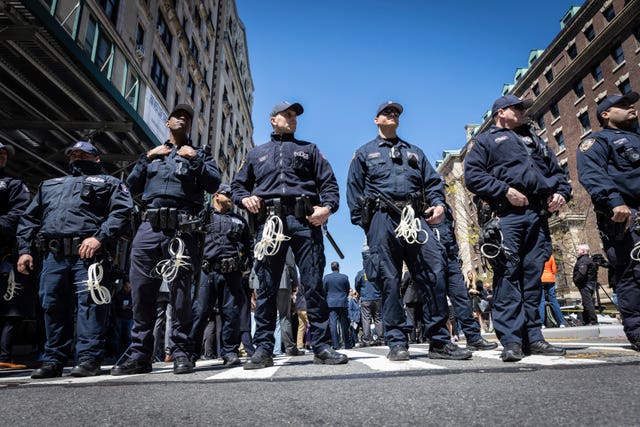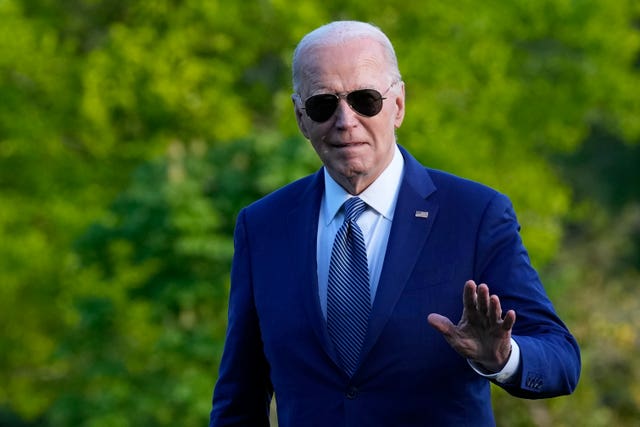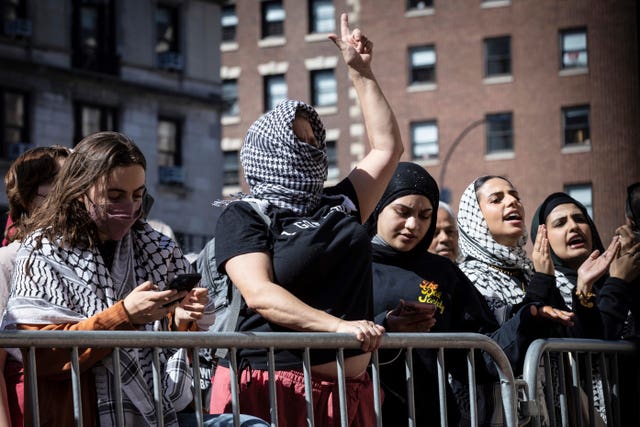Biden seeks to navigate Israel-Hamas war protests on US college campuses
Demonstrations have raised questions over the US President’s support among younger voters.

Student protests in America over the war in Gaza have created a new and unpredictable challenge for President Joe Biden as he resists calls to cut off US support for Israel while trying to hold together the coalition of voters he needs for re-election.
The protests at Columbia University in New York and other campuses have captured global media attention and raised questions about Mr Biden’s lagging support among young voters.
Columbia University said on Wednesday that it was making “important progress” with pro-Palestinian student protesters who set up a tent encampment and that it was extending a deadline to clear out.
However, stand-offs remain tense on the Ivy League campus in upper Manhattan.

Across the country, protesters at California State Polytechnic University, Humboldt, some 300 miles north of San Francisco, started using furniture, tents, chains and zip ties to block the building’s entrances on Monday evening.
Both campuses are part of intensifying demonstrations over Israel’s war with Hamas by university students demanding that the institutions cut any financial ties to Israel and divest from companies that are enabling the conflict. Dozens have been arrested on charges of trespassing or disorderly conduct.
Mr Biden’s handling of the Middle East conflict is also being closely watched by both Jewish and Arab American voters in key swing states.

At worst, they build momentum toward the Democratic National Convention in Chicago in August, potentially triggering scenes of violence that could recall the unrest of protests against the Vietnam War during the party’s convention there in 1968.
“If it ends with Columbia, that’s one thing,” said Angus Johnston, a historian focused on campus activism. “If this sends the national student movement to a new place, that’s a very different situation.”
Already, Mr Biden’s aides have had to work to minimise disruptions from anti-war protesters, holding smaller campaign events and tightly controlling access.
Demonstrators forced his motorcade to change routes to the Capitol on his way to deliver the State of the Union address, and they have thrown a red substance intended to symbolise blood near his home in Delaware.
The US President could face more confrontations with students this spring. Morehouse College said on Tuesday that Mr Biden would appear at the iconic historically black campus in May to deliver a commencement address that could draw protests.
More than 100 pro-Palestinian demonstrators camped out at Columbia were arrested, with dozens more people arrested at other campuses. Many now face charges of trespassing or disorderly conduct.
The protesters have demanded that their universities condemn Israel’s assault on Gaza after the October 7 Hamas attack and divest from companies that do business with Israel.

The White House, in a message Sunday to mark the Passover holiday, denounced what it called an “alarming surge” of antisemitism, saying it “has absolutely no place on college campuses, or anywhere in our country”.
Former president Donald Trump, Mr Biden’s presumptive Republican opponent in the presidential election this November, pointed to the headlines and images coming out of Columbia to redirect focus from his criminal hush money trial in New York, telling reporters in the courthouse Tuesday that Mr Biden bears the blame for the unrest.
“If this were me, you’d be after me. You’d be after me so much,” he said. “But they’re trying to give him a pass. But what’s going on is a disgrace to our country, and it’s all Biden’s fault and everybody knows it.”
Mr Biden has been endorsed this year by many leading youth activist organisations and built his campaign around key social issues – such as defending abortion rights, combating climate change and cancelling student debt for millions – that they believe can energise voters under 30 who are more likely to be concerned about his approach to Gaza.





